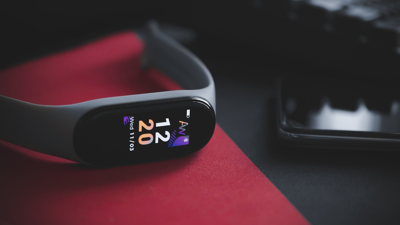
The market for AI-powered fitness devices, apps, and equipment is experiencing a period of rapid growth. Due to the popularity of products like the Oura ring, the Fitbit Sense 2, and the Samsung Galaxy Watch 8, as well as the rising global focus on health, the market is projected to be worth tens of billions of dollars in the coming years.
These devices use AI to analyze biometric data and provide customized guidance, but they’re also raising concerns about data privacy and AI security. In today’s piece, we’ll discuss three privacy and security challenges producers have when creating AI-powered fitness devices and their possible fixes.
1. Insecure Communication and Device Vulnerabilities
Many fitness devices, especially older or less expensive models, may lack robust AI security features. They often communicate with smartphones and the cloud via unencrypted Bluetooth or Wi-Fi connections, making the data susceptible to interception by hackers.
A compromised device can also serve as a gateway to infect other connected systems, such as your smartphone or home network.
The fix: This requires a collaborative effort between manufacturers and users. Manufacturers must implement robust encryption, use secure hardware, and provide regular, automatic firmware updates. Users should always install these updates, use strong passwords and enable two-factor authentication (2FA), and avoid syncing their devices over public Wi-Fi networks.
2. Data Collection without Proper AI Security Measures
Fitness bracelets, rings, or smartwatches collect a wide range of personal information, including biometric data (heart rate, sleep patterns, body temperature), geolocation (where you run or work out), and even video footage of your home environment.
This creates a detailed and intimate digital profile that, if breached or misused, could have significant consequences.
The fix: Companies must provide clear, easy-to-understand privacy policies that explicitly state what data is collected, why, and with whom it's shared. Users should be given granular consent options, allowing them to opt in or out of specific data sharing practices.
Additionally, the manufacturer must conduct an AI security review to identify and address critical issues before the product is released to the market. You can do this with specialized tools, like Wiz AI Security Assessment, or by working with an AI security specialist who will run an audit of your processes.
3. Third-Party Data Sharing
Many fitness companies have business models that rely on sharing or selling anonymized (or not-so-anonymized) user data to third parties, such as advertisers, insurers, or pharmaceutical companies. This can happen without the user's explicit and clear consent, and the data may be used to create risk profiles that could impact things like insurance premiums or employment opportunities.
The fix: Users must be aware of exactly what data is collected and with whom it is shared. This is where granular consent options play a significant role, as they enable users to choose which specific data points (e.g., heart rate, but not location) are shared with which third parties.
Additionally, the company must comply with privacy regulations, such as GDPR and CCPA. Of course, this is not just to avoid fines (as it often happens). Besides keeping users safe, you’re also building a strong reputation and establishing yourself as an authority in the market.
Considering the fact that fitness devices are a big part of a user’s life, the company behind them must prioritize privacy by design from the outset. This means implementing robust data encryption and minimizing data collection to only what's essential.
They must also be completely transparent about their data practices, providing clear, granular consent options so users can control what data is shared and with whom. If these rules are met, it’s a great way to foster long-term loyalty.










(0) comments
We welcome your comments
Log In
Post a comment as Guest
Keep it Clean. Please avoid obscene, vulgar, lewd, racist or sexually-oriented language.
PLEASE TURN OFF YOUR CAPS LOCK.
Don't Threaten. Threats of harming another person will not be tolerated.
Be Truthful. Don't knowingly lie about anyone or anything.
Be Nice. No racism, sexism or any sort of -ism that is degrading to another person.
Be Proactive. Use the 'Report' link on each comment to let us know of abusive posts.
Share with Us. We'd love to hear eyewitness accounts, the history behind an article.